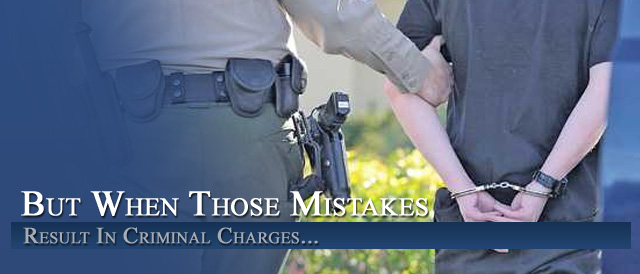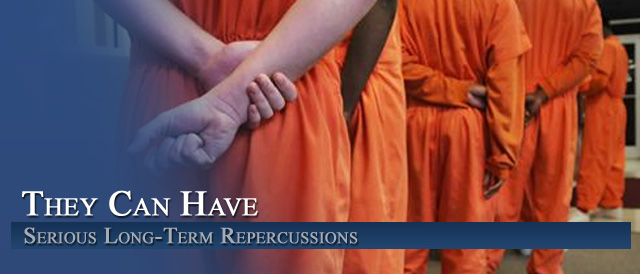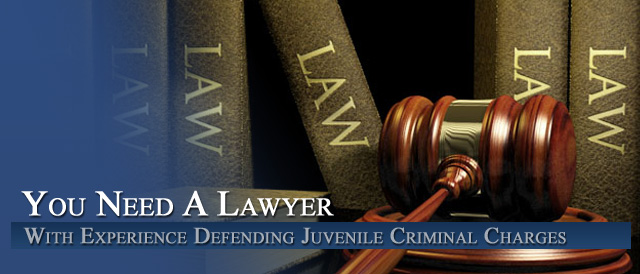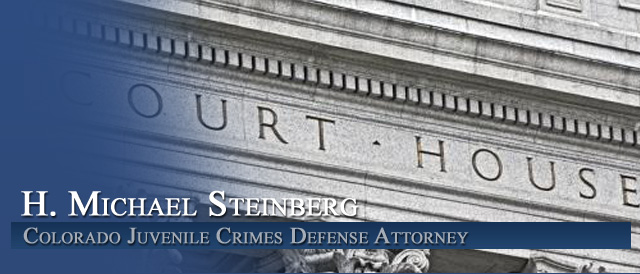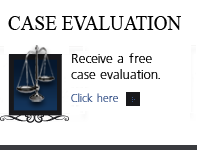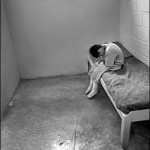Please feel free to contact me 24-7-365 to discuss your case...
Seasoned and Experienced Attorney for Criminal Charges in Denver, the Front Range and All of Colorado
Business Hours: 303-627-7777 Pager: 303.543-4433 or Cell in emergencies at 720-220-2277
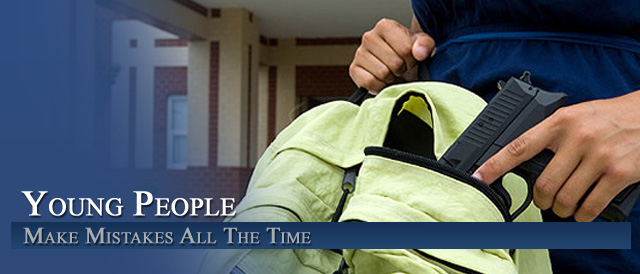
The Arrest of Juveniles In Colorado – Colorado Criminal Juvenile Law Part II of II
Your Child Is Arrested Or Receives A Criminal Summons In The Mail in Colorado – Now What?
By H. Michael Steinberg – Colorado Criminal Juvenile Defense Lawyer – Attorney
The Arrest of Juveniles In Colorado – Colorado Criminal Juvenile Law. After reviewing Part I – you have many more questions. As a parent or family friend – how can help? This article addresses those issues and fears.
In Colorado What Should You Know As A Parent If Your Child Is Charged With A Juvenile Crime
The Arrest of Juveniles In Colorado – The Knock At The Door
Whether it is your child’s first and only criminal case or not – the juvenile justice system will likely come into your family’s lives as a knock on the door or a phone call from the police.
Your child has been arrested…now what?
As the overwhelming sense of fear begins to overtake you – a mixture of questions and emotions follows when you learn your child is arrested.
Of course your first concern is your child’s welfare – is he or she all right? Where are they? Are they coming home – when – how? Can you pick them up?
Next you will undoubtedly focus on the circumstances surrounding the arrest.
What is the accusation? Was anyone else involved? Who? Were there injuries – and was our child’s involvement primary or secondary?
Was your child unjustly accused?
Your Child’s The Future Is In Jeopardy
Once you begin to see the shape of the case against your child – your next and most natural fear is one for their future. How is this case going to impact the family’s hopes and dreams?
Next Anger
Then there is anger … anger with the police, the alleged victim or victims in the case for filing charges, the court system – the other juveniles involved … and of course – anger at you own child for being in this situation.
Embarrassment And Humiliation Need To Take A Back Seat To Good Decisionmaking
Humiliation and embarrassment – especially if your child is arrested in your home – in front of neighbors is also natural. At a time when you should be reaching out to family and friends for help and guidance – you may be so embarrassed or humiliated by your child’s arrest, you may not do so.
Family members can sometimes hurt your feelings with predictions that this was “in the works” for some time. The judgments may or may not follow. But along with those judgements may be much needed support both financial and emotional.
A Search For The Best Outcome For Your Child In The Colorado Juvenile Justice System
Questions For Your Lawyer:
1. What is going to happen to your child as he or she goes through the system?
2. If the evidence of guilt against my child is overwhelming – how can I work with juvenile probation and the juvenile court together to help my child?
3. Who will be involved? Who are the people involved in the juvenile justice system? Who are the players?
4. What are my child’s rights and what are my responsibilities to my child?
How The Colorado Juvenile Justice System Is Different From The Adult Justice System?
Offenses are considered delinquent acts rather than crimes.
- Hearings may sometimes be closed to the public
- Hearings are presided over by a Magistrate not a Judge (at least at first)
- The Colorado juvenile justice system is focused primarily on treatment, rehabilitation and supervision as opposed to punishment.
- In all but the most serious cases there is no right to a jury trial in Juvenile Court.
- The legal verbiage – the language is totally different – children are not convicted – they are “adjudicated delinquent.”
The Arrest of Juveniles In Colorado – Multiple Focus Points
While it may seem confusing – the Colorado juvenile justice system comes down to these factors:
- The needs of your specific and individual child
- The nature of the crimes charged
- Whether there was injury or damage done
- Is this your child’s first case – first arrest?
- Whether there is future risk to other people or other property.
The Most Important Of The Players And Decision Makers In The Colorado Juvenile Justice System
Decision makers in the juvenile justice system are many. Different people have authority at different stages in the process. Your lawyer needs to be constantly aware of what decisions and when they are being made. Who has the authority and what authority can they exercise – is important to know.
YOU – no one else – are responsible for your child’s future. Therefore YOU need to be informed and involved every decision.
Juvenile Pretrial and Pobation Staff – These people wear many hats and act in many different settings. They have different titles and responsibilities within the juvenile probation department. One might be an intake office – or screener. Another probation staffer could be out in the community – another assigned to home visits of a resources person for treatment and or placement options. Make sure you know the name, title and phone number of the individuals who are working with your child.
The Judge – Judges are in District Court – if you object to the jurisdiction of the Magistrate – which is an option you have in juvenile court – you can elect for a full fledged Colorado Disrict Court judge to preside over your case.
The Magistrate – Magistrates are attorneys who are appointed by Judges to serve in the judicial capacity in Juvenile Court and to conduct certain basic types of hearings. Magistrates most often hear detention hearings, detention review hearings, placement hearings, dispositional review hearings or probation revocation hearings in both misdemeanor and felony cases.
The District Attorney or Prosecutor – Every county in Colorado has an elected District Attorney. Working under him or her are numerous deputy district attorneys such as the DA’s assigned to juvenile court. They are typically younger and less experienced lawyers than those in adult felony court.
The Criminal Defense Attorney – Criminal Defense Lawyers licensed by the State of Colorado to practice law – usually retained by family onbehalf of the juvenile.
The Guardian ad Litem – A person appointed by the court to act in the best interest of the child/juvenile is called the guardian ad litem.
Your child’s attorney represents ONLY the interests of the child – not the parent. Where those interests conflict – the attorney is duty bound to represent the child. This can be a tough situation especially where you might disagree with your own child’s decision on how to proceed. The lawyer must fully explain to your child and to you the consequences each of his or her decisions.
You Are Your Child’s Most Important Advocate
The filing of charges against your child can bring a feeling of crisis in a family. It may seem as if you have lost control over his or her behavior. Actually – the opposite is usually true – a criminal case often presents as an opportunity to rebuild your relationship with your child – to turn his or her life in a new direction – to find a new direction for the future.
Some Strong Recommendations For Parents Of My Clients
1. Attend every court hearing and meeting – arrive on time if not early. Your presence at Court hearings is very important to make certain you are actively involved in your child’s case.
2. Participate in all decisions about your child and with him or her. Be assertive – don’t be shy – don’t feel intimidated. Speak up on his or her behalf and make your opinions known. Participate even if it is to provide positive historical information about your child to your lawyer. Writing and gathering letters from others on behalf of your child to the judge and DA is also a helpful exercise. LINK
3. Make certain you are included in all planning meetings and decisions about your child with probation staff.
4. Build respectful relationships with everyone involved in the case regardless of how you may personally feel about your child’s situation. Juvenile justice staff persons, lawyers and judges should view you as a well mannered and respectful communicator. This is difficult at times, but it is essential and in the long run – it will help your child.
5. Stay calm and ask clear questions. Build mutual respect by communicating with court and juvenile probation staff that you are not only concerned for your child’s welfare – you see these individuals as acting on your child’s best interest. Work closely with your lawyer on this issue – if it turns out the case is “trumped up” or your child is innocent – you have maintained your credibility with the Court and seeking a dismissal will be much easier as your relationship with court and probation personnel is one of trust.
6. Be Organized And Prepared Keep an expandable file with you containing all records from the case. All paperwork -reports, letters, and court notices should be contained in this folder. Take notes every aspect of the case and the names and statements of the people involved.
If And When Your Child Is Arrested
When and if the call from the police officer is received, find out what the charges are.
Has your son or daughter been arrested for:
A suspected new offense
or
A warrant for arrest
If your child is arrested – they will be taken to a juvenile detention center as they cannot be housed with adults in the adult city or county jails. Law enforcement also MUST Notify parents or guardians whenever a youth is arrested.
Determine how serious the charges are. If the charge is a non-violent misdemeanor it is less serious. Even a violent misdemeanor such as third degree assault is less serious than a felony assault or aggravated robbery, sexual assault or distributing controlled substances.
The Arrest of Juveniles In Colorado – Some Concrete Actions You Can If Your Child Is Arrested
1. Try to see your child as soon as possible.
2. Keep that notebook putting in the notebook the names, dates, and phone numbers of people involved in the case from it’s inception.
3. Take careful notes of your conversations and meetings. Write down your questions, your thoughts and your concerns.
4. Make a decision on whether you have the resources to retain a good Colorado criminal lawyer or you do not. If you do not – do the best you can to protect your child’s rights. Read articles like this one to become as familiar as you can with the juvenile justice process.
5. Do not allow the police to question your child.
6. If you retain a lawyer DO – tell your child to be honest that lawyer and leave nothing out.
7. Make certain your cell is charged and is working. Have a trusted friend’s phone number “on deck” in case you are not available.
Next – The Detention Hearing And Screening Process – How The Decision To Release Your Child Is Made
The Arrest of Juveniles In Colorado
ABOUT THE AUTHOR: H. Michael Steinberg – Email The Author at: hmichaelsteinberg@colorado-juvenile-crimes-lawyer or call his office at 303-627-7777 during business hours – or call his cell if you cannot wait and need his immediate assistance – 720-220-7777.
If you are charged with A Colorado crime or you have questions about The Arrest of Juveniles In Colorado, please call our office. The Law Offices of H. Michael Steinberg, in Denver, Colorado, provide criminal defense clients with effective, efficient, intelligent and strong legal advocacy. We can educate you and help you navigate the stressful and complex legal process related to your criminal defense issue.
H. Michael Steinberg, is a Denver, Colorado criminal defense lawyer with over 40 years of day to day courtroom experience – specializing in Colorado Criminal Law along the Front Range. He will provide you with a free initial case consultation to evaluate your legal issues and to answer your questions with an honest assessment of your options. Remember, it costs NOTHING to discuss your case. Call now for an immediate free phone consultation.
Helping Clients To Make Informed Decisions In the Defense of Colorado Criminal Cases.
Contact A Lawyer with Three Decades of Experience as a Denver Criminal Attorney at The Steinberg Colorado Criminal Defense Law Firm Today.
Colorado Defense Lawyer H. Michael Steinberg provides solid criminal defense for clients throughout the Front Range of Colorado – including the City and County courts of Adams County, Arapahoe County, City and County of Boulder, City and County of Broomfield, City and County of Denver, Douglas County, El Paso County – Colorado Springs, Gilpin County, Jefferson County, Larimer County, and Weld County,…. and all the other cities and counties of Colorado along the I-25 Corridor… on cases involving …The Arrest of Juveniles In Colorado.
Other Articles of Interest:
- Colorado Juvenile Criminal Process – The Arrest – Summons
- The Arrest of Juveniles In Colorado – Colorado Criminal Juvenile Law Part I of II
- Understanding The Colorado Juvenile Pretrial System Part II of II
- Why You Should Hire A Lawyer In A Juvenile Criminal Case At The Investigation Stage
- Understanding Colorado House Arrest – Home Detention Technology and Procedures
